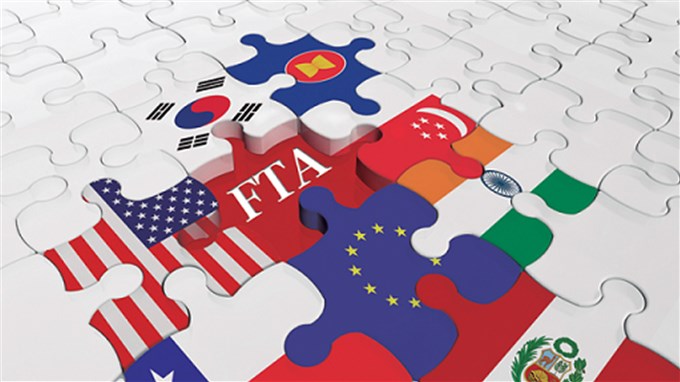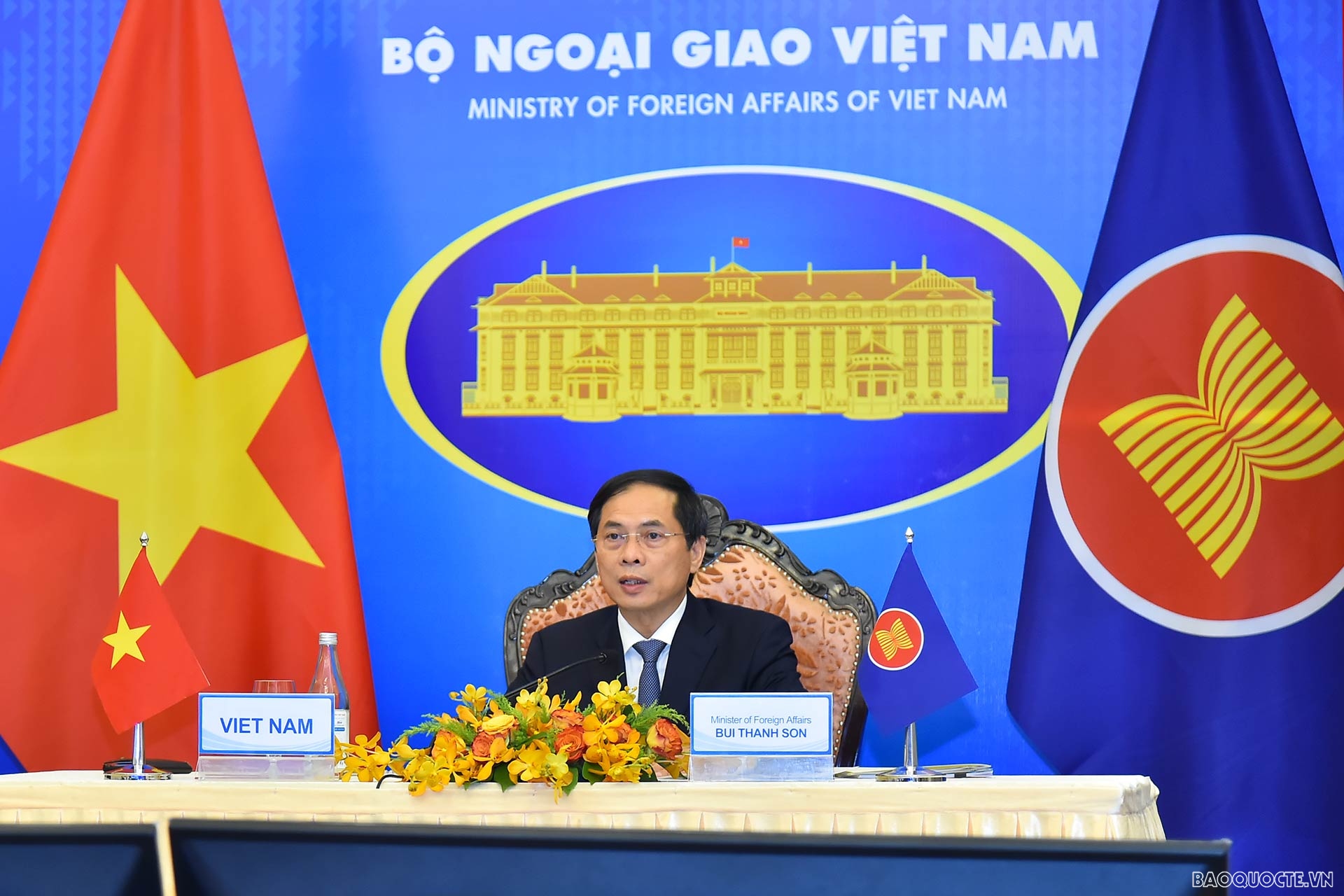
International economic integration in the new period
Latest
During the process of national construction and development, comprehensive international economic integration has become an important driving force, contributing to promoting economic growth, improving competitiveness, and affirming Viet Nam's position.
 |
| Viet Nam is integrating deeply into the world. (Photo: Vietnamplus) |
The document of the 13th Party National Congress clearly states that Viet Nam needs to maintain its independence and autonomy in determining the country's economic development guidelines and strategies; maintaining major balances, focusing on ensuring economic security; continuously strengthening the country’s economy.
Viet Nam needs to consistently pursue multilateralization and diversification of international economic relations, avoiding being dependent on any single market or partner. Improve the economy's resilience to negative impacts from external fluctuations. The country also needs to proactively perfect the defense system to protect the economy, enterprises, and the domestic market, complying with its international commitments.
Viet Nam’s milestones in integration
In fact, during the 35 years of Doi Moi policy, Viet Nam has actively and proactively participated in multilateral and regional economic institutions, such as the Association of Southeast Asian Nations (ASEAN) in 1995, the Eurasian Economic Forum (ASEM) in 1998, the Asia-Pacific Economic Cooperation (APEC). In particular, Viet Nam’s membership in the World Trade Organization (WTO - 2007) marked the country’s comprehensive integration into the global economy.
In recent years, Viet Nam has deeply integrated into the world economy. The Vietnamese economy’s openness is considered to be the highest in the world, with trade-to-GDP ratio of over 200%.
In addition, Viet Nam is among countries with a high level of economic integration, having joined and signed 17 free trade agreements (FTAs). Among them are the Comprehensive and Progressive Agreement for Trans-Pacific Partnership (CPTPP); the EU-Viet Nam Free Trade Agreement (EVFTA), the Regional Comprehensive Economic Partnership (RCEP), and the FTA between Viet Nam and the UK (UKVFTA).
To join such a large network of FTAs, Viet Nam has fundamentally perfected the legal system according to international requirements, standards and practices. The process of opening up and extensive international integration also put pressure on Viet Nam to reform successfully.
Along with that, open-door policy and international integration also make an important contribution to the great achievements of the country. They have also helped to confirm Viet Nam's position in the international arena, as well as marked an important historical milestone in the process of international economic integration.
Director of the Multilateral Trade Policy Department (Ministry of Industry and Trade) Luong Hoang Thai said that Viet Nam has established free trade relations with almost all the important countries in the world, creating a solid foundation for strengthening and promoting bilateral trade and investment exchanges, as well as strengthening international economic integration in the region and in the world.
With a series of FTAs in implementation and others under negotiation, Viet Nam has become a focal point of the vast network of free trade areas, accounting for 59% of the world's population and 68% of global trade, contributing to the increasing interweaving interests of Viet Nam with most of the leading partners in the region and the world.
Deputy Director of the Import and Export Department (Ministry of Industry and Trade) Tran Thanh Hai also assessed that Viet Nam’s exploitation of FTAs has resulted in important achievements, contributing to fast and sustainable export development, gradually reducing dependence on other markets.
In 2020, even though the Covid-19 pandemic broke out globally and disrupted the supply chain, the Vietnamese economy was still standing tall. This is a great resource for its economy to keep up the momentum in the next stages.
"With the unpredictability of the pandemic, Viet Nam is still facing serious challenges. But the FTAs that Viet Nam is and will be a part of, will open new doors, contributing to making Viet Nam an important link in the network that connects the leading economies and the global value chains”, said Mr. Tran Thanh Hai.
In addition, in the process of economic integration in ASEAN, Viet Nam has also marked many important milestones when fulfilling the role of ASEAN Chair in 1998, 2010 and more recently in 2020. In 1998, just 3 years after becoming an official member, Viet Nam successfully organized the 6th ASEAN Summit.
The Ha Noi Plan of Action, stipulated at the Summit, helped maintain cooperation and strengthen the Association's position during the 1997-1998 Asian financial crisis. And in 2010, Viet Nam successfully assumed the role of ASEAN Chair, especially in promoting the implementation of the ASEAN Economic Community (AEC).
 |
| Foreign Minister Bui Thanh Son. (Photo: Tuan Anh) |
Orientations in the new period
According to Foreign Minister Bui Thanh Son, Viet Nam has earned great achievements of historical significance after 35 years of Doi Moi and 25 years of international integration since joining ASEAN. With increasingly affirmed international position and prestige, our country entered the stage of participating in international economic linkage with a completely new state of mind.
Since we are still witnessing complicated global and regional situations, opportunities and challenges are intertwined. In order to take advantage and further promote the achievements of international economic integration, raising the level of participation, contribution and position of Viet Nam, the Foreign Minister said that it is necessary to focus on the following orientations:
Firstly, we need to put priority on the effective implementation of commitments in FTAs and economic cooperation mechanisms, of which we are a member. The implementation of commitments in the volatile and fiercely competitive international environment puts us in front of many new and complex issues such as trade, investment, technology disputes, issues related to labor, the environment, etc. They require us to firmly grasp international and domestic regulations and coordinate synchronously among all levels and sectors to handle them appropriately and effectively.
Secondly, we should continue to improve and expand our network and our economic integration bilaterally and multilaterally with partners and organizations around the world, bringing Viet Nam into the center of global economic linkages. However, we need to be consistent with the foreign policy of independence, self-reliance, peace, friendship, cooperation and development, diversification and multilateralization of foreign relations.
Thirdly, it is necessary to actively participate in the process of shaping the regional structure, building economic governance frameworks and regulations at regional, inter-regional and global levels. Also, Viet Nam needs to make effective and responsible contributions to solve common problems, especially ensuring a free, open and rules-based multilateral trading system, reforming the WTO, and promoting sustainable and inclusive development, etc.
It is also necessary to actively participate in the development of international frameworks and regulations on digital economic governance and digital transformation, on the basis of suitability with our interests; continue to effectively implement the policy of "participating in shaping multilateral institutions" and Directive No. 25 of the Party Central Committee's Secretariat on promoting and elevating multilateral diplomacy.
Foreign Minister Bui Thanh Son emphasized: “In the new era of strategy, under the leadership of the Party and the State, the diplomatic sector will continue to promote its pioneering role in creating a peaceful and favorable environment for the Vietnamese people. Economic diplomacy for national development will continue to be an important task of the sector.
The Ministry of Foreign Affairs and Vietnamese representative missions abroad will continue to make efforts, take advantage and promote the potential, role and position of the country, in order to contribute to the successful implementation of guidelines, policies and development goals set out by the 13th National Party Congress, from now to 2045 on the 100th anniversary of the founding of the country".

























